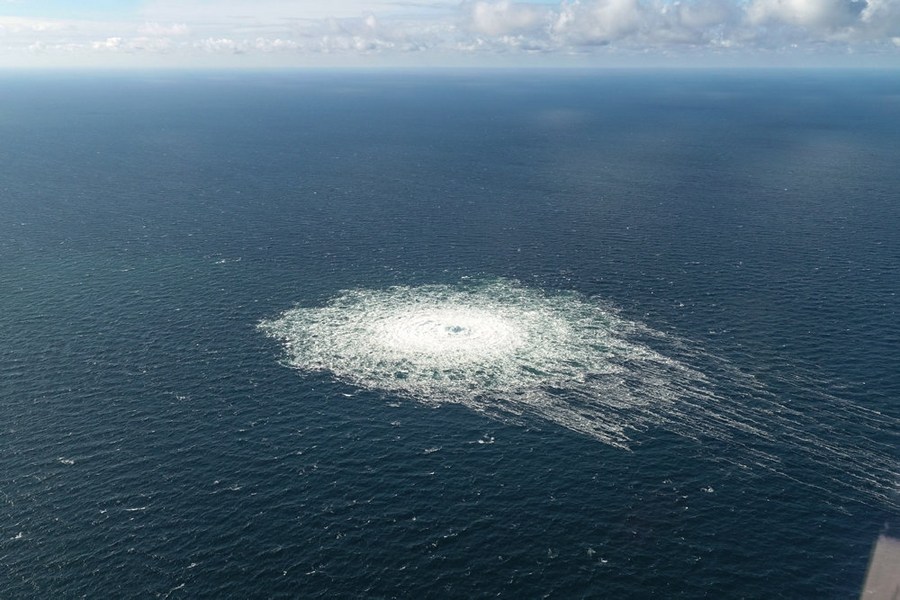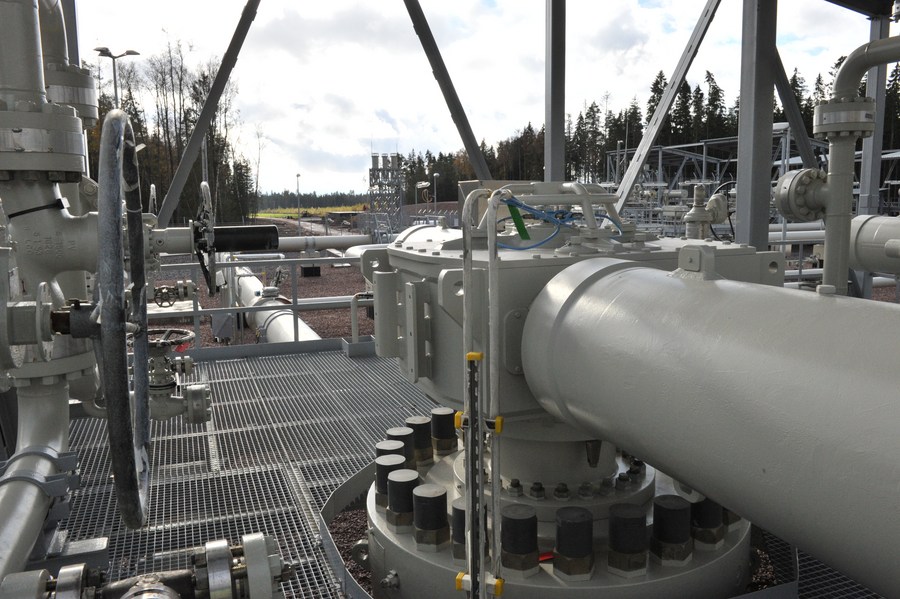European experts question unusual silence over Nord Stream blasts

This aerial photo released by the Danish Ministry of Defense on Sept. 27, 2022 shows the Nord Stream gas pipeline leak site. (Danish Defense Ministry/Handout via Xinhua)
Germany, has been particularly affected by the energy crisis due to the end of gas supplies from Russia. However, the country's government, like its allies, has refrained from talking about the explosions in public.
BERLIN, March 6 (Xinhua) -- Despite their own heavy losses, European countries -- especially Germany -- have unanimously kept silent over the blasts that destroyed the Nord Stream 1 and 2 pipelines last September and subsequent investigations.
Since veteran investigative journalist Seymour Hersh exposed the U.S. Navy's involvement in the explosions on the U.S. portal Substack last month, more and more experts have questioned Europe's atypical, collective silence.
According to Hersh, a U.S. Pulitzer Prize winner, the U.S. Navy divers last June planted the remotely triggered explosives that destroyed three of the four Nord Stream pipelines months later.
Europe's largest economy, Germany, has been particularly affected by the energy crisis due to the end of gas supplies from Russia. However, the country's government, like its allies, has refrained from talking about the explosions in public.

Picture taken on Oct. 8, 2012 shows Nord Stream pipeline equipments before the opening ceremony of the North Stream second gas link in Portovaya bay, some 60 kilometers from the town of Vyborg in northwestern Russia. (Xinhua)
A German government spokesperson refused to comment on Hersh's article at Xinhua's request at a press conference last month. At the same time, German media have widely moved to discredit Hersh's article.
Once proven that the pipelines were indeed blasted by the United States, it would overturn the European public's recognition of the current narratives by the West, which claimed that European infrastructure was "under the threat of Russia," said Li Xing, professor of development and international relations at Denmark's Aalborg University.
That the U.S. Navy was involved in the Nord Stream pipelines explosions last year, as discovered by Hersh, was an "economic war" against its submissive allies in Europe, Jan Oberg, a Swedish expert, told Xinhua in an interview.
"One must wonder when the Europeans will wake up and finally understand that they no longer share interests with the U.S.," stressed Oberg, director of the Transnational Foundation for Peace and Future Research.

Photo taken in Arlington of Virginia, the United States, shows a screen displaying U.S. President Joe Biden and German Chancellor Olaf Scholz (not pictured) attending a press conference at the White House in Washington, D.C. Feb. 7, 2022. Joe Biden told the press conference that if Russian tanks and troops cross the border and enter Ukraine, "there will be no longer Nord Stream 2," referring to the now-finished pipeline delivering natural gas from Russia to Germany through Ukraine. (Xinhua/Liu Jie)
Croatian security expert Mirko Vukobratovic told Xinhua that the alleged involvement of the U.S. Navy in the September 2022 Nord Stream explosions was "not impossible."
The United States has the most to gain from the destruction of the pipelines, Josep Puigsech, a Spanish political expert at the Autonomous University of Barcelona, told Xinhua.
"I increasingly believe that the incident that led to the breaking of the gas pipeline was the result of an action by the United States," Puigsech said.
Photos
Related Stories
- Hungary demands UN investigation into Nord Stream pipeline attack: Helsinki Times
- Abnormal for West to dodge Nord Stream explosive revelations
- Fair, objective probe urged into alleged U.S. involvement in Nord Stream blasts
- Biden orders Nord Stream pipeline blasts to step up pressure on Germany: media
- Interview: Spanish expert blames U.S. for Nord Stream pipeline blast
Copyright © 2023 People's Daily Online. All Rights Reserved.









